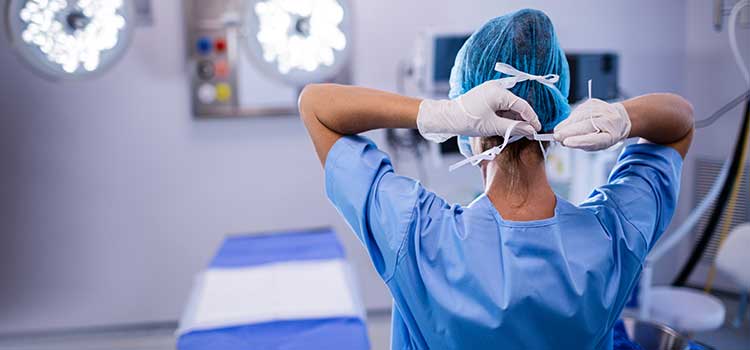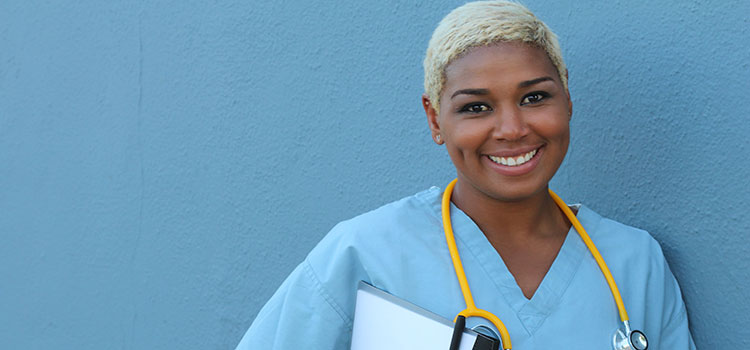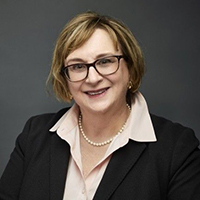How to become a nurse in New York
If you want to become a nurse, you may be wondering what the requirements are where you live and want to work. Requirements vary by state, and although many states have similar requirements, it can be difficult to know whether your state follows suit with the norm.
It may come as no surprise that the greater New York City metropolitan area employs the largest number of nurses in the United States compared to other metro areas, according to the U.S. Bureau of Labor Statistics (BLS). New York is a big state, however, and there are nursing opportunities whether you are upstate or downstate. If you want to join this vast legion of nurses, continue reading to find out what’s needed to start a rewarding nursing career in New York.
Despite being at one time an epicenter of the COVID-19 pandemic, the field of nursing in New York has bounced back for the most part, according to Dr. Kimberly Glassman, the Senior Associate Dean of Academic Affairs and a clinical professor at New York University’s Rory Meyers College of Nursing. “The future is bright. And I would say the present is bright—and I’m speaking largely of large urban and suburban areas where the highest concentration of nursing schools are.”
Start your nursing career in New York in 7 steps
Get a nursing degree.

Nurses in the state of New York must have at least an Associate Degree in Nursing (ADN) or Bachelor’s of Science in Nursing (BSN) to become a registered nurse (RN). If you are getting your degree in the state of New York, it should be from a nursing program approved by the New York State Education Department (NYSED). Keep in mind that nurses in New York must obtain at least a BSN within ten years of initial licensure in order to maintain your license. That means that all new nurses will eventually need at least a BSN if you don’t get one right away.
Complete coursework in infection control and child abuse reporting.

New York nurses must also complete a certain amount of coursework in infection control and child abuse reporting. This is already built into degree programs that are registered with NYSED, but may have to be completed separately if you earn your degree elsewhere.
Apply for your nursing license (and limited permit, if applicable).

In order to sit for the NCLEX-RN exam, you must apply for a nursing license first and pay the appropriate fee to NYSED. You can also apply for a temporary limited permit if you are working, which will allow you to practice under RN supervision. You will be granted full licensure once you pass the NCLEX exam. The limited permit is valid for up to one year or until 10 days after being notified that you failed the NCLEX. Limited permits are only necessary for new nurses who have never taken the NCLEX exam. Check NYSED’s licensing requirements if you are a nurse from another state transferring to New York.
Pass the National Council Licensure Examination for Registered Nurses (NCLEX-RN).

This test is used to measure the minimum knowledge and skills needed to successfully enter the nursing profession. After successfully passing the test and fulfilling all requirements, NYSED grants you both a license an a registration certificate. Your license is valid for life unless it is surrendered, revoked, annulled or suspended.
Land a nursing job.

You’re ready to enter the workforce once you’ve got your RN license. Nurses can find jobs in numerous healthcare settings, including hospitals, clinics, schools, long-term and assisted living facilities and so much more.
Renew your registration every three years.

Although your license is valid for life, New York nurses must renew their registration every three years in order to continue practicing. You cannot practice if your registration is expired.
Keep up your continuing education.

New York nurses must demonstrate that they have taken appropriate infection control coursework every four years whenever they renew their registration. Your employer may have additional continuing education requirements as well. Keep in mind, some of these courses not only renew your license but help maintain any certifications you might have as well.
How long does it take to become a nurse in New York state?
The length of time it takes to become a nurse depends on what degree you get and a few other uncontrollable factors. Since an ADN can typically be completed in about two years and a BSN in four, an ADN will allow you to enter the workforce sooner.
Assuming you complete your education in the state of New York, your nursing degree program must be registered with the NYSED. If you get a degree in a state other than New York, it must be approved by the licensing authority of the state to which it belongs.
New York nurses must also complete a certain amount of coursework in infection control and child abuse reporting. This is already built into degree programs that are registered with NYSED, but may have to be completed separately if you earn your degree elsewhere.
Getting your license also depends on a few factors out of your control, like how quickly you can take the NCLEX, how long it takes to receive your test results and how long it takes the state to process your application for a license. Typically, you’ll receive your results roughly six weeks after taking the exam. If you applied to take the NCLEX right after graduating, received your Authorization to Test (ATT) and then tested within the 90-day window to do so, that means you could have your nursing license within a few months of graduation from a nursing program.
BSN in 10
It’s important to note that New York’s “BSN in 10” law states that all new nurses must obtain a BSN within ten years of initial licensure in order to keep their license. Although that still makes an ADN the quickest way to get a license, you would eventually need to get another degree to maintain it. This law does not apply to nurses that were already licensed prior to this bill going into effect, which was December 19, 2017.
“Associate degrees are still an important entry-point into the nursing profession. Those programs still exist and even in New York state with BSN in 10 on the books, it was never intended to stop the pipeline of associate degree nurses,” Glassman said. “That’s because there are a lot of areas in this big New York state where the only way to get into nursing is through a community college because that’s the only thing that’s near you, so associate degree programs are still really important.”
Glassman also said that most ADN programs have articulation agreements with a bachelor’s degree program. This means that you can graduate from your ADN program, get into the workforce, and then be pre-admitted to a bachelor’s program where you can finish off the credits needed to earn your BSN.
Continuing education requirements
The only statewide continuing education requirements for registered nurses in New York is that they must complete coursework in infection control every four years, in addition to the coursework that must be completed prior to initial licensure. You must demonstrate this whenever you renew your registration, which is every three years.
“There are no continuing ed requirements for nurses in New York,” Glassman said. “The only thing that you need to do in New York is take a refresher course on infection control every four years.”
“There are no continuing ed requirements for nurses in New York…“
Glassman said that continuing education requirements are more employer-driven rather than mandated statewide. This means that most nurses are going to have to take continuing education courses as required by their employer.
Is New York a compact state?
The Nurse Licensure Compact (NLC) authorizes nurses to practice in all participating states. New York is not currently a compact state. This means that if you are a nurse transferring to or from New York, you may need to obtain a new license to practice. This could change eventually since there is legislation pending that would allow New York to join the compact in the future.
The COVID-19 pandemic did spur a caveat to New York’s licensing requirements, however.
“There was this interesting issue of needing to import a lot of healthcare workers, and so New York state loosened the licensing laws,” Glassman said. “If you were a nurse licensed in another state, you could come practice in New York and you did not have to have a New York license.”
The executive orders issued by Governor Kathy Hochul that made this possible are set to expire, but could be extended. If you are a nurse transferring to the state of New York, be sure to check the licensing laws at that time.
Nurse job outlook in New York
Employment of nurses across the nation is expected to grow 5.6% through 2032, about as fast as average across all occupations according to the BLS.
That number could change, however, especially given the fact that New York City was one of the hardest-hit areas by the COVID-19 pandemic. This subsequently caused a wave of staffing shortages which have plagued the field of nursing long before COVID. New solutions like a scholarship program announced by Gov. Hochul in 2021 could mean an influx of nurses in the near future and beyond. The program will pay for tuition for 1,000 nursing students in the hopes of getting more nurses into the workforce quickly. Furthermore, Gov. Hochul hopes to grow the state’s healthcare workforce by 20% in the next five years.
“Hospitals are hiring. The trend of patient care shifting to the community is still happening. Everybody is still opening tons of ambulatory surgery centers, so nurses who work in the hospital are moving out to fill these am-surge centers and we need them there,” Glassman said.
This trend towards more community-based patient care is expected to bring about a lot of new opportunities for nurses, said Glassman, not only by creating more jobs themselves but also diversifying the types of care settings that nurses can work in.
“On the school side, yes, we have to prepare nurses to work in hospitals, but we have to prepare them to work in newer areas that are hiring new graduates—home care is hiring new graduates, am-surge centers are hiring new graduates, office practice and primary care is hiring new graduates—so we have to sometimes do a little bit less in the hospital and look for more community-based placements so we can get that experience for students.”
Median annual salaries for nurses in New York
The median annual salary for nurses in the state of New York ranks in the highest bracket at $104,570 but not in the top five among all states. The New York City metro area has a higher median annual salary—highest in the state—than the statewide median. The other highest paying metro areas include Ithaca, Buffalo, Rochester and Kingston.
In order to set yourself up for a successful career, Glassman’s advice to new graduates is to take any job you can get. “The first thing you have to do is get employed. The most important thing is to get out into the practice setting and use your knowledge.” Once you’ve gained some experience and exposure to the kinds of practice settings you can work in, then you can consider transitioning to a setting or specialty that interests you. The reality is, what you dreamed of doing while you were in school might not end up being a great fit if you don’t get the chance to explore your options.
“There are so many ways that nurses are used in a variety of ways that I think new nurses have to understand what all those options are, because they’re not going to learn about that in their schools,” Glassman said. “Not every school has the ability to create really unique and interesting clinical experiences for students.”
Find out how to become a nurse in your state
The process of becoming a nurse is different depending on the state in which you are seeking licensure. Each state has different requirements and standards that you should be aware of.
Here are some of the top nursing states in the U.S. and the steps to become a nurse in each:
Requirements for foreign-educated nurses
For nurses who were educated outside of the United States, chances are you must meet additional requirements in order to practice in the state of New York, including proof of proficiency in English and having your prior credentials vetted.
New York recommends candidates use the Commission on Graduates of Foreign Nursing Schools (CGFNS)’s Credential Verification Service. This non-profit organization will determine whether your nursing education meets standards needed for licensure in New York State.
Make sure and double-check the state Board of Nursing’s expectations to determine what pathways are available.
Useful organizations to know
The New York State Education Department (NYSED) Office of the Professions regulates licensing for nurses throughout the state, and should be consulted for any licensing-related questions or other information.
The New York State Nurses Association (NYSNA) is the largest union and professional association for RNs in the state. They have a wealth of information about the profession and continuing education resources that can be useful whether or not you are in a union.
American Nurses Association – New York (ANA-NY) is a non-union professional organization for nurses. By joining, you get access to numerous member benefits including career support, networking opportunities, continuing education units and more.
The New York Organization for Nursing Leadership (NYONL) is another professional organization for nursing leaders that offers many educational and networking opportunities to participating members, among other benefits.


With professional insight from:
NYU Rory Meyers College of Nursing




